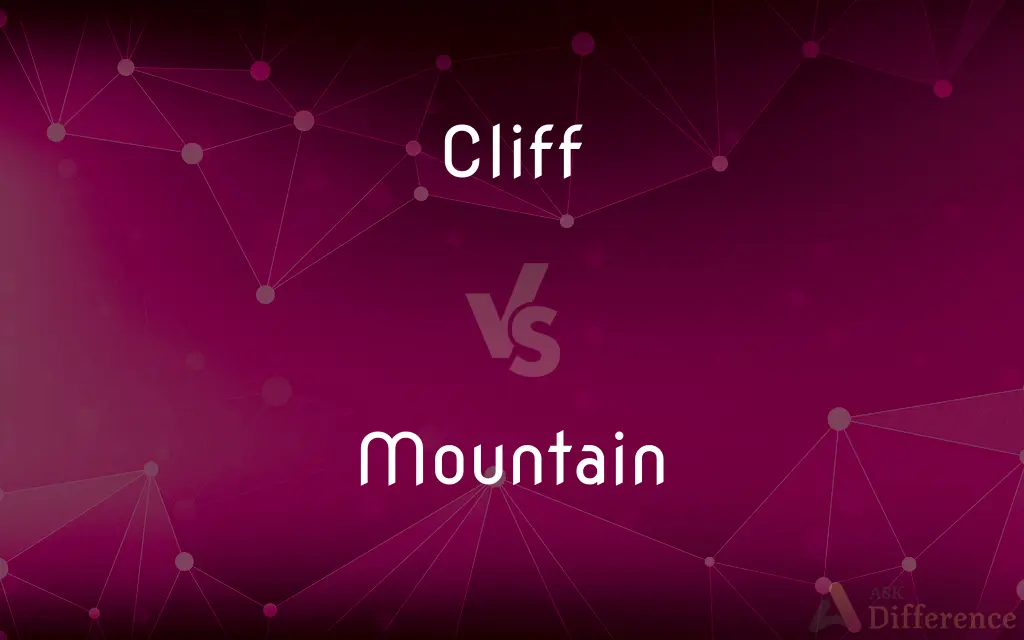Cliff vs. Mountain — What's the Difference?
By Maham Liaqat & Urooj Arif — Updated on March 26, 2024
A cliff is a steep, high face of rock or earth, while a mountain is a large landform that rises prominently above its surroundings, typically having a peak or summit.

Difference Between Cliff and Mountain
Table of Contents
ADVERTISEMENT
Key Differences
Cliffs are characterized by their sheer or nearly vertical faces, often formed by processes such as erosion or the movement of the Earth's crust. Mountains, however, are defined by their significant elevation and are usually part of a larger mountain range, formed through tectonic forces or volcanism.
While cliffs can be part of a mountain's landscape, contributing to its rugged terrain, they are not necessarily indicative of the overall size or the geological processes involved in the mountain's formation. In contrast, a mountain's definition encompasses not just its elevation but also its formation, structure, and the role it plays in the earth's topography.
Cliffs are often sought out for their scenic beauty or as challenges for climbers, offering dramatic views and sheer drops. Mountains attract a variety of recreational activities, such as hiking, climbing, and skiing, and have significant ecological and climatic impacts on their surroundings.
The formation of cliffs is usually due to the erosion of rock layers by water, ice, or wind, or by the collapse of land along fault lines. Mountains are formed over much longer periods, through the folding, faulting, and volcanic activity associated with the movement of tectonic plates.
While both cliffs and mountains can contribute to the dramatic landscapes, they are distinct in their formation, structure, and the roles they play in the natural world. Cliffs are defined by their steep faces, while mountains are notable for their height, mass, and the extensive processes involved in their formation.
ADVERTISEMENT
Comparison Chart
Definition
A steep, high face of rock or earth.
A large landform that rises above its surroundings, typically with a peak.
Formation
Erosion by water, ice, or wind; movement along fault lines.
Tectonic forces, volcanism, folding, and faulting.
Characteristics
Sheer or nearly vertical faces.
Significant elevation, usually part of a range.
Role in Landscape
Part of a landscape's rugged terrain, scenic beauty.
Dominates landscapes, impacts climate and ecology.
Recreational Activities
Climbing, photography, sightseeing.
Hiking, climbing, skiing, ecological studies.
Compare with Definitions
Cliff
A challenge for climbers and adventurers.
Climbers tackled the sheer cliff face with ropes and gear.
Mountain
Characterized by a variety of ecosystems.
The mountain supported diverse habitats, from forests at its base to alpine conditions near the summit.
Cliff
Formed primarily through erosion or geological activity.
The cliff was shaped by centuries of wind and water erosion.
Mountain
A destination for outdoor sports and recreation.
The mountain offered trails for hiking in summer and skiing in winter.
Cliff
Offers habitats for specific plants and animals.
Birds of prey often nest on inaccessible cliff faces.
Mountain
A large, natural elevation of the earth's surface.
The mountain's peak was covered with snow year-round.
Cliff
A vertical or steep natural wall of rock or earth.
The cliff overlooked the ocean, offering breathtaking views.
Mountain
Impacts weather patterns and local climate.
The mountain range influenced the region's climate, creating a rain shadow effect.
Cliff
Frequently found along coastlines, in mountainous areas, or as part of canyon landscapes.
The coastal cliffs were a popular tourist destination.
Mountain
Formed by tectonic forces or volcanism.
The mountain range was created by the collision of continental plates.
Cliff
In geography and geology, a cliff is an area of rock which has a general angle defined by the vertical, or nearly vertical. Cliffs are formed by the processes of weathering and erosion, with the effect of gravity.
Mountain
A mountain is an elevated portion of the Earth's crust, generally with steep sides that show significant exposed bedrock. A mountain differs from a plateau in having a limited summit area, and is larger than a hill, typically rising at least 300 metres (1000 feet) above the surrounding land.
Cliff
A steep rock face, especially at the edge of the sea
A coast path along the top of rugged cliffs
Mountain
Abbr. Mt. or Mtn. A natural elevation of the earth's surface having considerable mass, generally steep sides, and a height greater than that of a hill.
Cliff
A high, steep, or overhanging face of rock.
Mountain
A large heap
A mountain of laundry.
Cliff
A vertical (or nearly vertical) rock face.
Mountain
A huge quantity
A mountain of trouble.
Cliff
(figurative) A point where something abruptly fails or decreases in value etc.
Mountain
(countable) An elevation of land of considerable dimensions rising more or less abruptly, forming a conspicuous figure in the landscape, usually having a small extent of surface at its summit.
Everest is the highest mountain in the world.
We spent the weekend hiking in the mountains.
Cliff
A high, steep rock; a precipice.
Mountain
(countable) Something very large in size or quantity; a huge amount; a great heap.
He was a real mountain of a man, standing seven feet tall.
There's still a mountain of work to do.
Cliff
See Clef.
Mountain
(figuratively) A difficult task or challenge.
Cliff
A steep high face of rock;
He stood on a high cliff overlooking the town
A steep drop
Mountain
Wine from Malaga made from grapes that grow on a mountain.
Mountain
(cartomancy) The twenty-first Lenormand card.
Mountain
A large mass of earth and rock, rising above the common level of the earth or adjacent land; earth and rock forming an isolated peak or a ridge; an eminence higher than a hill; a mount.
Mountain
A range, chain, or group of such elevations; as, the White Mountains.
Mountain
A mountainlike mass; something of great bulk; a large quantity.
I should have been a mountain of mummy.
Mountain
Of or pertaining to a mountain or mountains; growing or living on a mountain; found on or peculiar to mountains; among mountains; as, a mountain torrent; mountain pines; mountain goats; mountain air; mountain howitzer.
Mountain
Like a mountain; mountainous; vast; very great.
The high, the mountain majesty of worth.
Mountain
A land mass that projects well above its surroundings; higher than a hill
Mountain
A large number or amount;
Made lots of new friends
She amassed a mountain of newspapers
Mountain
Relating to or located in mountains;
Mountain people
Common Curiosities
What defines a cliff?
A cliff is defined by its steep, often vertical face, resulting from processes like erosion or geological activity.
How do mountains form?
Mountains form through processes such as tectonic activity, folding, faulting, and volcanic eruptions.
What is the difference between a mountain and a hill?
The main difference is in elevation and prominence; mountains are generally taller and more prominent than hills, though the distinction can vary by region.
Can a mountain have cliffs?
Yes, many mountains have cliffs as part of their terrain, contributing to their rugged landscape.
Are cliffs found only in mountainous areas?
No, cliffs can also be found along coastlines, in canyons, and in other landscapes where erosion or geological activities create steep faces.
How do cliffs and mountains impact the environment?
Both play significant roles in their ecosystems, providing habitats and influencing local climate and weather patterns.
Why are mountains important to the climate?
Mountains can affect climate patterns by blocking wind and precipitation, creating rain shadows, and influencing temperature variations.
Can the formation of a mountain affect a cliff?
Yes, the geological processes that form mountains can also create cliffs, either through uplift and erosion or volcanic activity.
Do all mountains have a peak?
Most mountains have a peak or summit, but some flat-topped mountains, known as mesas or plateaus, have a more level surface.
What recreational activities are common on mountains?
Hiking, mountain climbing, skiing, and ecological studies are among the many activities people enjoy on mountains.
Share Your Discovery

Previous Comparison
Edition vs. Volume
Next Comparison
Seminar vs. TrainingAuthor Spotlight
Written by
Maham LiaqatCo-written by
Urooj ArifUrooj is a skilled content writer at Ask Difference, known for her exceptional ability to simplify complex topics into engaging and informative content. With a passion for research and a flair for clear, concise writing, she consistently delivers articles that resonate with our diverse audience.














































